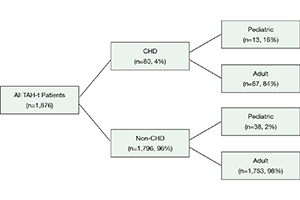The total artificial heart in patients with congenital heart disease
Abstract
Background: While ventricular assist devices (VADs) remain the cornerstone of mechanical circulatory support (MCS), the total artificial heart (TAH-t) has gained popularity for certain patients in whom VAD support is not ideal. Congenital heart disease (CHD) patients often have barriers to VAD placement due to anatomic and physiological variation and thus can benefit from the TAH-t. The purpose of this study is to analyze the differences in TAH application and outcomes in patients with and without CHD.
Methods: The SynCardia Department of Clinical Research provided data upon request for all TAH-t implantations worldwide from December 1985 to October 2019. These patients were divided into two groups by pre-implantation diagnosis of CHD and non-CHD.
Results: A total of 1,876 patients were identified. Eighty (4%) of these patients also carried a diagnosis of CHD. There was a higher proportion of children in the CHD cohort (16.3% vs. 2.1%, P<0.001) and this translated into a lower average age amongst the two groups (34±13 vs. 49±13 years, P<0.001). There were also significantly more females in the CHD group (22.8% vs. 12.8%, P=0.010). CHD patients were more likely to be supported with a 50 cc TAH-t (11.3% vs. 4.5%, P=0.005) while all other support characteristics, including duration of support, were similar between the groups. All measured outcomes were similar between CHD and non-CHD patients including positive outcome (alive on device or transplanted), 1-month conditional survival, and rate of Freedom Driver use.
Conclusions: TAH-t is an effective means to support patients with CHD. Patients with CHD had similar survival, support characteristics, and frequency of discharge compared to patients without CHD. As MCS continues to grow, its indications broadened, and its contraindications narrowed, more patient populations will see the benefit of the TAH’s continuously developing technology.
Cover






